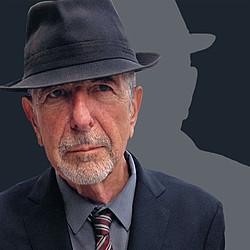A tasteful bunch of flowers, a gloomy painting, an awkward air of formality and a near funereal song played through speakers: it's either a wake of your average Leonard Cohen playback.
Tonight at London's Canadian Embassy on Grosvenor Square Leonard Cohen discussed his 13th studio album Popular Problems with DJ and author Stuart Maconie. Bar some absolute nonsense from the European press - you haven't lived till you've watched a Spanish journalist ask a Canadian musical titan about Scottish independence - the event itself was a triumph, with Cohen himself showing that nearing 80 hasn't dimmed either his appreciation of a well-cut suit or his intellectual curiosity.
Still, don't expect a laugh a minute. "I think this record has a mood of despair and melancholy," Cohen began, before making a rather unfortunate reference to "scraping the bottom of the barrel trying to get something together". Here are our highlights:
Leonard Cohen on...
His legendary status
"Sometimes I feel like an institution. Kinda like a mental hospital."
His satisification at finishing the new album
"I don't know how other writers feel but I just have a sense of gratitude that I could bring anything to completion in this vale of tears. So it's the doneness of the thing that I really cherish....I think it was Auden who said 'A poem is never finished, it's just abandoned.'"
Heading back to the blues
"That's our music, we don't want to reinvent the wheel. So we take the forms that are our available and try and work with those."
Going back on tour
"I liked life on the road, it's a lot easier than civillian life. You feel like you're in a motorcycle gang... It's a lot easier than this [interview], because I've got a band behind me."
The inspiration behind 'Born In Chains'
"We all live lives that are tethered to certain circumstances in which we find ourselves. We're born in chains and live in chains... but there are moments of liberation."
Whether performing gives him purpose
"If you can do anything it's satisfied. It's this and washing dishes that I really know how to do."
Singing Hallelujah
"The word 'Hallelujah' is so rich, so abundant. It's a wonderful world to sing and people have been singing that word for hundreds of years. It seems to pull down some beneficial energy when you declare it in the face of the kind of catastrophies that are mannifesting everywhere. Just to say 'Hallelujah', just to praise. It's very appealing to sing that word."
Finding meaning in songs written four decades ago
"It's always a problem to find a door into a song whether it's old or whether it's new. I don't really have a problem with that. Somehow the challenge of a concert or a song is really to find the meaning. We are all involved in this struggle at every moment because we lead the same lives over and over again. There are always these struggles of making it you and making it significant. Our relationships that we have in our daily lives with the people that we know, the idosyncracies. You just have to find to find a way to find the centre of the song, the centre of the person, the centre of the activity."
The references to war and the military on Popular Problems
"Of course it reflects the world that we live in. Of course it was not deliberate but one picks up these things from the atmosphere. I've tried over the year's to find a political position that no one can actually decifer."
If a manual for living with defeat what would be the key points
"That's a tough question. I wish I could come up with something because we are all living with defeat and failure and disappointment and bewilderment. We are all living with these dark forces that happen in our lives. The manual for living with defeat? Acknowledge that everyone suffers, everyone is engaged in an almighty struggle for self respect, meaning and significance. The first step would be to recognise that your struggle is the same as everyone else's struggle. Your suffering is the same as everyone else's suffering: that's the beginning of a responsible life. Otherwise it's just a savage battle with each other, unless we recognise that each of us suffers in the same way there is no possible solution: political, social or spiritual. We all suffer."
Whether he still plans to start smoking again when he hits 80
"Yes. Does anyone have a cigarette? So few places you can smoke now! I'm turning 80 in a couple of days and I smoked for 50 years or so, I gave up 10 years ago. But I really liked smoking. I think about it a lot. I'm thinking about it right now actually."
How important being Canadian
"Canadians are very involved in their country. We grow up on the edge of America and we watch America the way women watch men: very, very carefully. So when there is this continual cultural challenge right on the edge of your lives of course it develops a sense of solidarity. It is a very important element in my life."
Being big in Norway
"I've been trying to figure that out. I lived with a Norwegian woman for a long time and in Oslo for a while. My family came from Poland in 1860 so maybe that explains it."
On how his Jewish faith effects his life
"I grew up in a very observant family so it's not something I ever felt any distance from. It's not something I have to publicize or display. It is essential to my own survival: those values that my family gave me, Torah values are the ones that inform my life. I never stray very far from those influences."
Not celebrating birthdays
"One of the charitable elements of my family is that we don't celebrate birthdays, holidays or anniversaries. So everybody is left off the hook! If you forget someone's birthday or anniversary there are no penalties. I think [my 80th] will go by just like any other day - I might have a smoke."
Finding the upside
"I'm a closet optimist."
The followup to Popular Problems
"We're working on a new record, we've got half of it finished. hopefully we can play it in [the site of the new Canadian embassy] in Trafalgher Square.... The next record we're going to call Unpopular Solutions."









